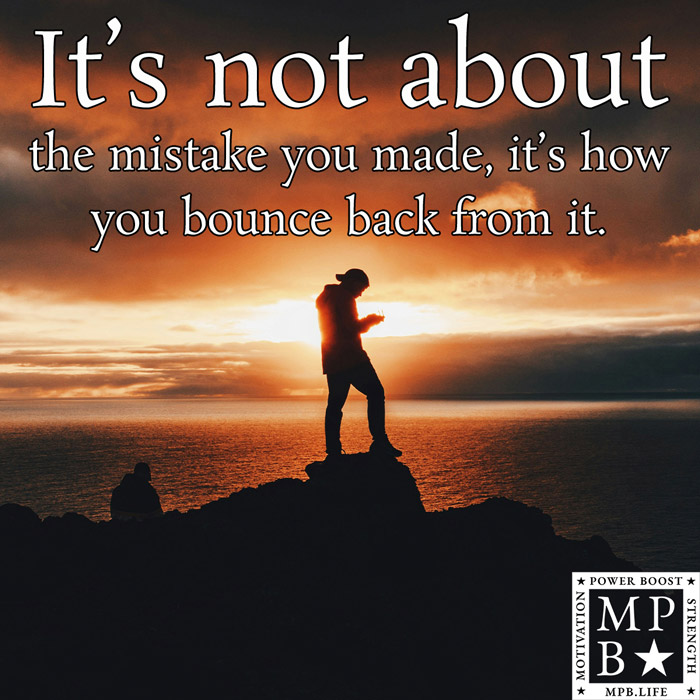
It’s Not About The Mistake You Made Graphic © motivationpowerboost.com
It’s not about the mistake
you made, it’s how you
bounce back from it.
Resilience: The Art of Bouncing Back
Life has a way of throwing curveballs when we least expect them. Mistakes, setbacks, and failures are an inevitable part of the human experience. However, the true measure of our character lies not in the mistakes we make, but in how we respond to them. The ability to bounce back from adversity is a skill that can be cultivated and honed, transforming obstacles into opportunities for growth and self-discovery.
When faced with a mistake or failure, it’s easy to get caught up in a spiral of self-blame and negativity. We may feel like we’ve let ourselves or others down, and the weight of our missteps can seem overwhelming. But dwelling on our mistakes serves no purpose other than to hold us back. Instead, we must learn to acknowledge our errors, take responsibility for them, and then shift our focus to the lessons we can learn and the actions we can take to move forward.
Bouncing back requires a mindset of resilience and adaptability. It means recognizing that mistakes are not defining moments, but rather stepping stones on the path to success. When we embrace this perspective, we open ourselves up to new possibilities and opportunities for growth. We become more willing to take risks, to step outside our comfort zones, and to pursue our dreams with renewed determination.
One of the keys to bouncing back is to cultivate a support system of people who believe in us and our abilities. Surrounding ourselves with positive influences – whether they be friends, family, mentors, or colleagues – can provide us with the encouragement and guidance we need to navigate challenging times. These individuals can offer a fresh perspective, help us identify our strengths, and remind us of our inherent worth and potential.
Another crucial aspect of bouncing back is to practice self-compassion. When we make a mistake, it’s easy to be hard on ourselves and engage in negative self-talk. However, treating ourselves with kindness and understanding is essential for building resilience. We must learn to forgive ourselves, to recognize that mistakes are a natural part of the learning process, and to approach our shortcomings with curiosity and a growth mindset.
Ultimately, the ability to bounce back from mistakes is a testament to our inner strength and resilience. It’s a reminder that we are not defined by our failures, but rather by our ability to learn from them and keep moving forward. By embracing this mindset, we can turn our setbacks into catalysts for personal and professional growth, and emerge stronger, wiser, and more resilient than ever before.
So the next time you find yourself facing a mistake or setback, remember that it’s not about the mistake itself, but about how you choose to respond to it. Embrace the opportunity to learn, grow, and bounce back with renewed determination and purpose. In doing so, you’ll discover that life’s greatest lessons and triumphs often lie on the other side of adversity.
Finding Balance: Overcoming the Perfection Paradox
While consistent effort is crucial for personal transformation, it’s equally important to strike a balance between striving for excellence and embracing imperfection. The pursuit of perfection can become a double-edged sword, leading to burnout, self-criticism, and a constant sense of dissatisfaction.
One of the key challenges is recognizing that perfection is an unattainable ideal. It’s a mirage that constantly shifts, leaving us feeling inadequate and unfulfilled. Instead of chasing an elusive standard of flawlessness, we can reframe our perspective and aim for progress over perfection.
Progress is a more realistic and empowering goal, as it acknowledges the inherent ups and downs of personal growth. It allows us to celebrate small victories, learn from setbacks, and continually refine our approach. By focusing on progress, we cultivate a growth mindset that fosters resilience and adaptability.
Achieving this balance requires self-awareness and self-compassion. We must learn to recognize our limitations, honor our unique strengths, and treat ourselves with kindness when we fall short. Perfectionism often stems from deep-rooted beliefs and societal pressures, and challenging these ingrained narratives is a crucial step towards self-acceptance.
Additionally, it’s important to recognize that consistency does not mean monotony. Incorporating variety and flexibility into our efforts can prevent stagnation and burnout. Experimenting with different strategies, seeking new challenges, and allowing for periods of rest and reflection can reignite our motivation and keep us engaged in the transformative process.
Ultimately, the journey of personal growth is a lifelong endeavor, and the path is rarely linear. By embracing consistent effort while letting go of the pursuit of perfection, we create space for authentic growth, self-discovery, and a sense of fulfillment that transcends external validation. It’s a delicate balance, but one that can unlock a deeper sense of contentment and purpose.
Related Inspirational Quotes
“It is not the critic who counts; not the man who points out how the strong man stumbles, or where the doer of deeds could have done them better.” – Elbert Hubbard
“Failures are the stairs we climb to reach success.” – Roy T. Bennett
“Failure is not the opposite of success, it’s part of success.” – Arianna Huffington
“It is failure that guides evolution; perfection offers no incentive for improvement.” – Colson Whitehead
“Fall seven times, stand up eight.” – Japanese Proverb
